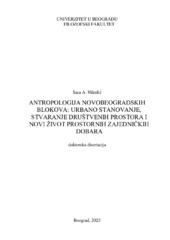Приказ основних података о документу
Antropologija novobeogradskih blokova: urbano stanovanje, stvaranje društvenih prostora I novi život prostornih zajedničkih dobara
| dc.creator | Nikolić, Sara | |
| dc.date.accessioned | 2024-04-12T08:50:04Z | |
| dc.date.available | 2024-04-12T08:50:04Z | |
| dc.date.issued | 2024 | |
| dc.identifier.uri | http://rifdt.instifdt.bg.ac.rs/123456789/3813 | |
| dc.description.abstract | Predmet ovog rada je antropološka analiza urbanog stanovanja, svakodnevice društvenog prostora i prakse zajedničkog u novobeogradskim blokovima 22 i 45. Prvi cilj ovog rada je da ispita i objasni promene u kulturi i načinu urbanog stanovanja u novobeogradskim blokovima. Drugi cilj ovog istraživanja je da proširi fokus antropološkog istraživanja stanovanja ka sagledavanju urbanog stanovanja u širem smislu, neodvojivo od života u susedstvu i (mesnoj) zajednici. Treći cilj ovog istraživanja je ispitivanje i procena dometa kritičkog angažmana samorganizovanih praksi i komšijskog udruživanja na Novom Beogradu. Konceptualnu i teorijsku osnovu istraživanja čine Lefevrova teorija proizvodnje društvenog prostora, kritičke teorije zajedničkih dobara i teorije privatizma. Etnografsko istraživanje novobeogradskih blokova 22 i 45 realizovano je u periodu od juna 2020. zaključno sa decembrom 2021. godine. Istraživanje je realizovano kroz tri konsekventna koraka, to su: senzobiografsko šetanje, foto-elicitacija i dubinski intervjui kod kuće. U istraživanju je učestvovalo dvadesetoro stanovnika i stanovnica istraživanih blokova. Interpretacija rezultata empirijskog dela istraživanja organizovana je u četiri celine. Najpre su interpretirani rezultati koji se odnose na svakodnevicu novobeogradskih blokova i zadovoljstvo stanovanjem. Zatim, u drugom delu, izloženi su nalazi o re-familifikaciji Novog Beograda kao specifičnoj podvrsti džentrifikacije post-jugoslovenskog, post-socijalističkog neoliberalnog grada. U trećem delu predstavljeni su uvidi o praksama stanovanja u užem smislu, odnosno o stambenom privatizmu i prisvajanju kroz potrošnju i transformaciju, a zatim o privatizmu javnih prostora i promenama odnosa prema zajedničkom prostoru i imovini koje su rezultat masovne privatizacije društvenog stambenog fonda. Konačno, u četvrtom delu prikazani su uvidi o komšijskom samoorganizovanju i aktivizmu na Novom Beogradu, te su diskutovani kritički dometi aktivizma koji se temelji na kulturi privatizma. | sr |
| dc.description.abstract | The subject of this study is an anthropological analysis of urban dwelling, everydayness of social space, and commoning practices in New Belgrade's large housing estates (blocks) 22 and 45. The first goal of this study is to examine and explain changes in the culture and manner of urban dwelling in New Belgrade. The second goal of this research is to expand the focus of anthropological research on housing towards the perception of urban dwelling in a broader sense, inseparable from life in the neighborhood and local community. The third objective of this research is to examine and evaluate the scope of critical engagement of self-organized practices and neighborhood engagement in New Belgrade. The conceptual and theoretical basis of the study is Lefebvre's theory of the production of social space, the critical theory of commons, and the theories of privatism. The ethnographic research of blocks 22 and 45 was carried out from June 2020 to December 2021. The research was carried out through three consequent steps: a senso-biographic walking, participant-generated photo-elicitation, and in-depth interviews at home. Twenty residents of the researched large housing estates participated in the study. The interpretation of the results of the empirical part of the research is organized into four parts. First, the results related to the everyday life of the New Belgrade blocks and housing satisfaction are interpreted. Then, in the second part, the findings on the refamilification of New Belgrade as a specific subtype of gentrification of the post-Yugoslav, post-socialist neoliberal city are presented. In the third part, the insights about dwelling practices in the narrower sense, that is, about housing privatism and appropriation through consumption and transformation, are interpreted. After that, the insights about the privatism of public spaces and changes in attitudes towards common space and property relations resulting from the "give-away" privatization of public housing stock are discussed. Finally, in the fourth part, insights about neighborhood self- organization and activism in New Belgrade are presented, and the critical scope of activism based on the culture of privatism is discussed. | sr |
| dc.language.iso | sr | sr |
| dc.relation | Ministry of Science, Technological Development and Innovation of the Republic of Serbia, institutional funding - 200025 (University of Belgrade, Institute for Phylosophy and Social Theory) (RS-200025) | sr |
| dc.relation | Sasakawa Young Leaders Fellowship 2020, 2021 | sr |
| dc.rights | openAccess | sr |
| dc.rights.uri | https://creativecommons.org/licenses/by/4.0/ | |
| dc.subject | velika stambena naselja | sr |
| dc.subject | zajednička dobra | sr |
| dc.subject | samoorganizovanje | sr |
| dc.subject | Novi Beograd | sr |
| dc.subject | privatizam | sr |
| dc.subject | prisvajanje kroz transformaciju | sr |
| dc.subject | džentrifikacija. | sr |
| dc.subject | large housing estates | sr |
| dc.subject | urban commons | sr |
| dc.subject | self-organization | sr |
| dc.subject | New Belgrade | sr |
| dc.subject | privatism | sr |
| dc.subject | appropriation through transformation | sr |
| dc.subject | gentrification | sr |
| dc.title | Antropologija novobeogradskih blokova: urbano stanovanje, stvaranje društvenih prostora I novi život prostornih zajedničkih dobara | sr |
| dc.type | doctoralThesis | sr |
| dc.rights.license | BY | sr |
| dc.citation.spage | 1 | |
| dc.citation.epage | 316 | |
| dc.type.version | publishedVersion | sr |
| dc.identifier.fulltext | http://rifdt.instifdt.bg.ac.rs/bitstream/id/13883/nikolic_sara.pdf | |
| dc.identifier.rcub | https://hdl.handle.net/21.15107/rcub_rifdt_3813 |

